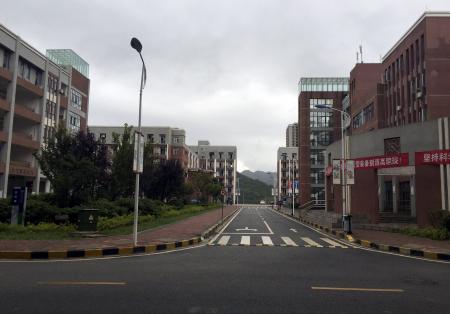By Duncan Hewitt -

SHANGHAI -- China’s economic growth slowed to 6.9 percent in the third quarter of the year, down from 7 percent in the first two quarters. The figure is the country’s slowest growth rate since the global financial crisis of 2009, and analysts said it emphasizes the challenges facing the world’s second largest economy, which has been hit by an export slowdown and falls in its stock markets.
China’s total GDP for the first three quarters was 48.78 trillion yuan ($7.68 trillion), according to the country’s National Bureau of Statistics (NBS). The 6.9 percent growth rate was slightly better than the 6.8 percent predicted by many economists – and the NBS described it as evidence of steady growth.
But it marks a sharp decline from last year’s 7.3 percent growth, and appears to back Chinese Premier Li Keqiang’s acknowledgment this weekend that it was “not easy” for the country to reach its target for the year of “about seven percent.”

Slowing global demand has played a part in a slump in exports, which were down 8.3 percent, 5.5 percent and 3.7 percent respectively, in dollar terms, over the past three months. The dramatic end of a year-long boom on China’s stock markets -- which have plunged some 30 percent over the past 4 months -- has also shaken business confidence. These factors have led to a decline in investment by businesses and falls in consumer confidence, which have contributed to a massive slowdown in China’s imports: these were down 20.4 percent year-on-year in September
The NBS said that China’s industrial output grew 6.2 percent in the first three quarters (though this figure also slowed to 5.7 percent in September). Property investment, a key engine of China’s growth that has cooled significantly in recent years, also grew slowly, at 2.6 percent.
The main bright spots, analysts said, were growth in the service sector -- which was up more than 11 percent -- and in retail, which expanded by 10.9 percent year-on-year in September, up from 10.8 percent in August. Rural retail growth, seen as a potential growth area of domestic consumption, outstripped that of urban areas, while online sales continue to expand, and now account for 12 percent of China’s total retail sales.
 However, China's consumer price index has remained low, with many producers cutting prices to maintain sales, in signs of continuing anxiety.
However, China's consumer price index has remained low, with many producers cutting prices to maintain sales, in signs of continuing anxiety.
Premier Li said at the weekend that “continued strength in the labor market and services” were positive signs for China's economy, adding that as long as such factors persisted, “GDP [growth] a little higher or lower than 7 percent is acceptable.”
However President Xi Jinping acknowledged in an interview with Reuters on Saturday that there were “concerns about the Chinese economy.” And evidence that some sectors are being hurt by the slowdown has come with the sudden closure of a number of factories in labor-intensive manufacturing areas such as southern Guangdong province in recent weeks.
And debate also remains about the reliability of China’s economic data, though the authorities have recently adopted International Monetary Fund standards in an attempt to increase credibility of China's statistics.

What is clear is that the authorities are seeking to address the slowdown with an increase in infrastructure investment. Fixed-asset investment for the first three quarters was up 10.3 percent, with further increases predicted. China’s economic planners are stepping up spending on key sectors like railways, as they did during the global financial crisis in 2009, though officials have pledged to be more cautious in how they invest money this time around, and are seeking to attract more private investment for infrastructure projects.
A senior government official said over the weekend that “keeping relatively high growth of infrastructure investment is key to stabilizing economic growth.” Yu Bin, of the Development Research Center of China’s State Council or cabinet, said the country should speed up investment in hydropower, rural roads and improving agricultural land, and called for lowering the cost of financing for companies.
And a key meeting of China’s government to set economic policy for the next five years next week is expected to approve further infrastructure spending -- though some debate on the wisdom of such an approach remains. Zhu Yunlai, former head of the China International Capital Corporation, and son of former Premier Zhu Rongji, recently criticized plans to boost the economy through investment, saying many such projects were “inefficient” in market terms, the South China Morning Post reported.

Still some economists predict a gradual rebound in China's growth rate, as stimulus measures take effect. The government recently reduced the down-payment requirement for first-time home buyers, for example, while Li-gang Liu, chief China economist at ANZ Bank, said in a research note sent to International Business Times that new loans were above expectations in the third quarter. He predicted that China's slowdown “will soon bottom out.”
However he and other analysts also predict that further rate cuts will be required, as the government seeks to boost the economy. China has already cut interest rates five times over the past year, and has reduced the reserve requirement ratio for banks, though ANZ's Liu said this was still high.
President Xi also pledged in his Reuters interview that China would continue to open up to foreign investment in the near future. However some observers say a need to maintain rapid growth may delay the implementation of further market-oriented reforms, something many foreign investors and analysts have called for.
